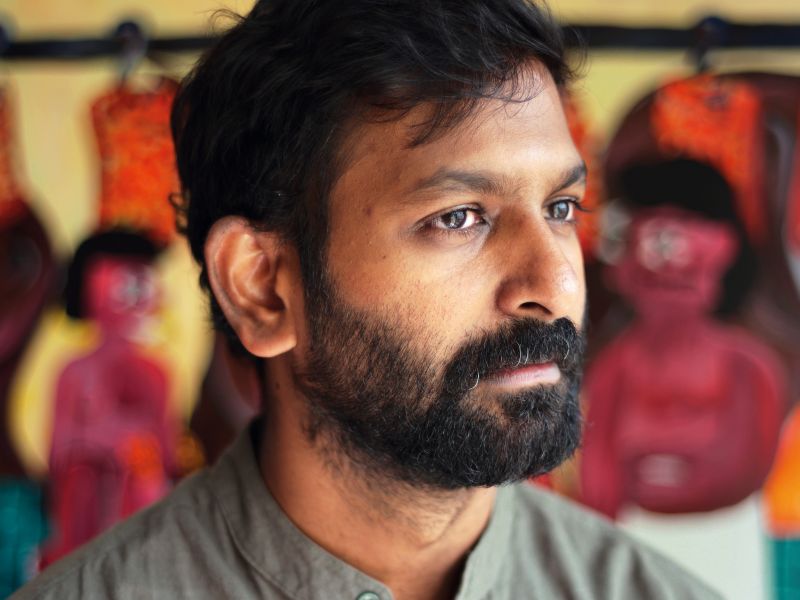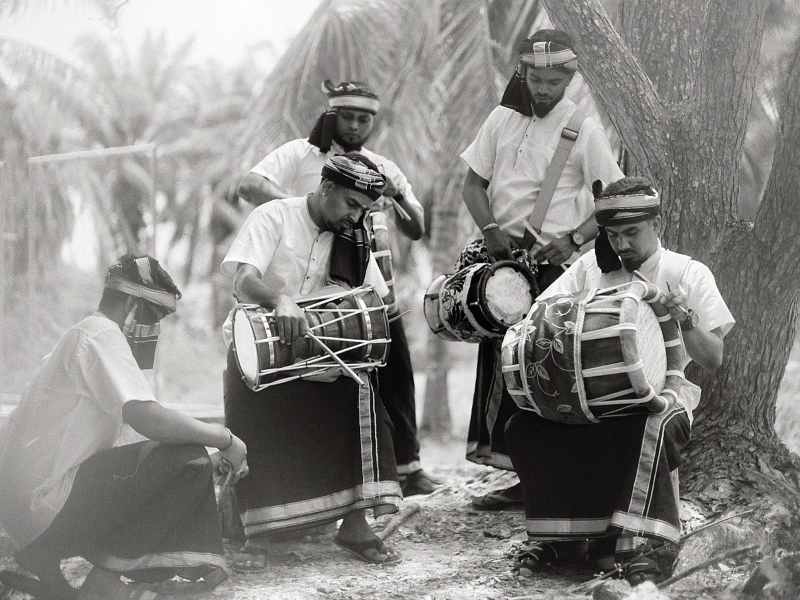
Papa and Marapan face a test of faith after discovering their male sacrificial goat is pregnant (All photos: Ananth Subramaniam/Bleat)
Director and writer Ananth Subramaniam’s love for storytelling was sparked by the many movies he watched at home with his parents from a young age. The concepts of cinema as an art form and humour as a tool for social commentary were completely alien to him. He simply thought it was cool that films could tell different stories — an idea he picked up from the tapes they bought, filled with shows in various languages. It was quite unusual for a family in small-town Banting, Selangor.
While recognising the importance of reading and devouring films, Ananth also sees the need to “consume everyday life” — such as hanging out with family members, and having fun with friends who have nothing to do with books — to know the reality of a situation, stay grounded and constantly be fascinated by things.
What intrigues him is the perpetual tussle between tradition, belief and identity — a theme he explores in Bleat!, one of 10 short films selected from 2,340 submissions for Cannes Critics’ Week 2025, which ran alongside the 78th Cannes International Film Festival from May 13 to 24.
Ananth’s 15-minute work — the first Malaysian short film to compete in the fest’s sidebar event — centres on an elderly Malaysian-Tamil couple who discover that the male goat they had been fattening up for ceremonial slaughter is pregnant. Absurd? So, should they submit to faith and societal expectations and kill it anyway, or suffer the wrath of the gods?
“I’ve always had an inescapable feeling about my culture. Growing up, especially during those awkward puberty years, I wrestled with questions about who I was and where I fit in. The expectations felt heavy, sometimes impossible, and my community always seemed to be in a constant state of change. So, I turned myself into a goat and threw myself into the middle of all that inevitability — and, somehow, that became a film about what makes being Malaysian-Tamil so special,” the 33-year-old filmmaker says.
bleat_ananth_subramaniam_directors_portrait_2.jpg

Only four Malaysian feature films have ever made it to Cannes — Tiger Stripes by Amanda Nell Eu (2023), The Tiger Factory (Woo Ming Jin, 2010), Karaoke (Chris Chong Chan Fui, 2009) and Kaki Bakar (U-Wei Saari, 1995). Eu’s Malay-language art-house horror won the grand prize for best feature at Critics’ Week last year.
Bleat! was shot in black and white, with Tamil dialogue and English subtitles. Its cast are locals from Banting, led by Tharmasegaran M S Maniam playing Marapan and Pannerselvam Evarani as Papa. Big Boy, the goat, is the star around whose hooves the ground starts to tremble after he conceives. But examining order through film and peeling back the layers of tradition are what Ananth has always wanted to do.
“The whole process was kind of organic. I started with the strange image of a pregnant goat. It felt unsettling but also very beautiful. I thought, ‘What happens if you drop this kind of wild and primal energy into a world that is very traditional, very much in control?’ Questioning such a world does not mean I’m against it. It is about challenging set ideas and trying to get answers to why things are the way they are.
“I’ve always loved stories in which being different, having your own opinion and standing up for what you believe force people to confront what they’re afraid of in themselves. When they watch the movie, viewers will be thinking about what it means to belong, and the cost of belonging. The tension between community and the desire for freedom is something really global. Everybody feels it, no matter what their culture is.”
Telling things honestly and saying what he wants is not going against somebody or something. “This movie is about a community just living their life,” says Ananth, who studied architecture at Taylor’s University before doing his master’s in film at Kingston University, London.
Often, stories about the Indian community have been trivialised, ignored or not presented in the right way, he thinks. There are many more that have not been told. “We lack the voice to express ourselves without being judged. I guess it’s this angst that [led] me to go full on and do the film, unapologetically.”
Humour tempers the tension in Bleat! and Ananth was mindful about finding the right emotional tone and balance between surrealism and reality, without letting the film feel too strange and alienating, or lean too much into comedy. “It’s a bit difficult because comedy can easily be slapstick, especially when it comes to weirdness.”
bleat_4.png

His parents may have exposed him to movies, but it was his grandparents, “a hilarious pair who like to crack jokes with each other”, who showed him the warmth and power of mirth. No surprise that Marapan and Papa are based on them.
Set in suburban Malaysia, Bleat! is a co-production led by Choo Mun Bel aka Belz of Sixtymac Pictures in Selangor, Bradley Liew of Epicmedia Productions (the Philippines), and France’s Dominique Welinski. Belgium-based Hors du Bocal handles international sales.
Choo and Ananth have worked together for close to a decade and made four shorts. The first, Colourless, is about a hearing-impaired girl who can swim faster than anybody else but faces problems navigating her way to the top and through life with her single-parent father. It bagged the grand prize for the BMW Shorties 2018. Two years later, Liar Land won special mention at the Locarno Film Festival. It was followed by The House of Brick and Stone (2022).
Post-production for Bleat! was completed in Malaysia by Om Shakthi Films and Tentoseven Creative, with colour grading by White Light Post (Bangkok) and Filmtroop (Malaysia), and sound post-production by DB Studios (Lebanon). There was also support from the Singapore SGIFF Short Film Fund and Singapore Momo Distribution Grant in 2024.
Sixtymac and Epicmedia are teaming up again to produce Ananth’s first feature, The Passport, a coming-of-age punk musical sung in Tamil and Malay. It follows a Tamil rocker traumatised after being forced to undergo a “virginity check” to prove her eligibility for a UK visa. Work on this film, which highlights cultural and gender discrimination, began at end-2022 and they hope to go on floor next year. Already, it has won prizes at various project markets.
Through collaborations with fellow creatives from different regions, Ananth has picked up what distribution involves, strategies to get a film onto the international stage and making sure it reaches all audiences. He also benefits from mentoring by seasoned hands in the field who, whenever he is afraid to write, urge him to push more.
bleat_choo_mun_bel_producers_portrait_1.jpg

Two things surprise him in his film journey, he says. The first is the comment that Malaysia does not have enough talent. “That’s not true. When Belz and I started, we hadn’t done anything before. But we learnt together and made Colourless, then the next film and the next.
“The second thing is finding my voice. I came into this industry trying to make a Robocop and Lord of the Rings, and thinking, ‘Okay, I’m gonna make big monster movies’. But the more I did, the more I realised even if I were to do so, I would make it a Tamil Robocop, you know, put my own spin on it. I guess that comes with experience.”
Filmmaking had not become any easier, though. “Honestly, it’s tough because there is no money in making shorts. It’s really the desire to do cinema.” So, like everybody else, Ananth does advertisements, takes the odd editing job, and runs production house Idio Sync Inc, which he co-founded.
“But you never forget cinema. Usually, I’d work for, say, a year, save up money and put it in a short and then repeat the process.”
The monetary returns may be skimpy for now, but recognition is exhilarating, albeit surreal. “I remember we got the news about Bleat! being picked for Cannes around 2am. I could not breathe or sleep and was like, ‘There’s no way this is real. Let’s wait for another email’.”
Bleat! had its world premiere at the Critics’ Week, founded in 1962 by the French Syndicate of Cinema Critics and known for spotlighting filmmakers and launching their careers. Among these are Hong Kong director Wong Kar-Wai, Mexico’s Alejandro González Iñárritu and French director and screenwriter Julia Ducournau.
Ananth hopes to take the short to festivals and show it in Malaysia. “It would be futile to make such a specific movie and not release it in the land where it was made.”
Meanwhile, he shares the reactions of his movie-buff parents, who have watched the film. “They were shocked. But Bleat! doesn’t disregard culture. It shows the beauty of it, and also the problems. Then, they were curious and asked me a lot of questions. There were some jokes they laughed at particularly. I think laughter is very good. I see that we cannot laugh very much nowadays. Or we do not.”
This article first appeared on May 26, 2025 in The Edge Malaysia.


